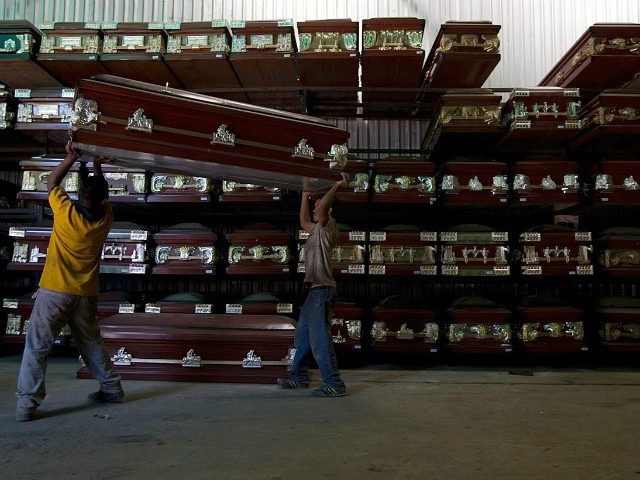Venezuela’s morgues are woefully lacking in preservation chemicals, air conditioning, and essential supplies, resulting in the rapid decay of dozens of bodies, some even exploding as part of the decomposition process.
The revelation of the alarming state of Venezuela’s morgues surfaces in a report published this month in the local medium El Pitazo, in which morticians protest that they cannot keep up with the sheer number of bodies being delivered to their doorstep in Latin America’s most violent nation, and they do not have the supplies to properly handle the bodies.
The story particularly highlights the events at a hospital where, due to overflow at the morgue, has also been keeping bodies. On October 5, El Pitazo reporters were on hand to document the handling of an exploding corpse at the Antonio Patricio de Alcalá University Hospital in the Caribbean city of Cumaná.
“It isn’t the first time a corpse explodes,” an unidentified worker tells the reporter. “It has happened at least two other times since mid-September.” The worker noted that, since the facility had run out of formaldehyde, chlorine, or any disinfectant, the bodies were at high risk of decomposition.
“All we have are some gloves,” he lamented.
Workers in both the hospital and morgues complain that the presence of such bodies has made the environment extremely toxic for them — in addition to extremely unpleasant, as the smell of death has overtaken the facilities.
The situation is not new. In July, CNN visited a morgue in the South American nation and found “corpses piled up, sometimes unidentified, on top of each other.”
“With so many homicide victims arriving everyday, the morgue staff can’t keep up,” the report notes. Their only resort is to designate a special “body room” to dump the remains that no families have claimed, where they sometimes stay, without being treated to preserve them, for months.
Caracas, Venezuela is the deadliest city in the world, excluding war-ravaged locations like Aleppo, Syria. Homicides have skyrocketed under socialist president Nicolás Maduro, who took over for dictator Hugo Chávez in 2013. Maduro’s gross mismanagement of the economy, including strict price controls and a prohibition on importing goods using currencies other than the failing Venezuelan bolívar, have not only caused the beginnings of a famine in the country but left it almost entirely devoid of medical supplies. The lack of basic goods coupled with the use of police to oppress anti-socialist protesters rather than combat crime has resulted in Caracas dethroning longtime world’s most violent city San Pedro Sula, Honduras.
The medical and criminal crises have sometimes overlapped in Venezuela. Such was the case in July 2014, when a criminal undergoing surgery was shot to death on the operating table after gunmen burst into the room.
Other hospital deaths include the deaths of 17 infants in 2015 after a hospital ran out of disinfectants and suffered a major opossum infestation. Amputations are far more common as hospitals cannot keep their stocks of antibiotics replenished, leaving amputation as the only option to stop an infection from spreading throughout the body.
“We don’t have face masks, asthma medication, very few antibiotics and we have no reactive materials for blood testing,” Dr. Teodoro Pérez, who works in a hospital that implemented a “bring your own” medicine policy, said in July. “We don’t even have test tubes to put the blood in.”

COMMENTS
Please let us know if you're having issues with commenting.